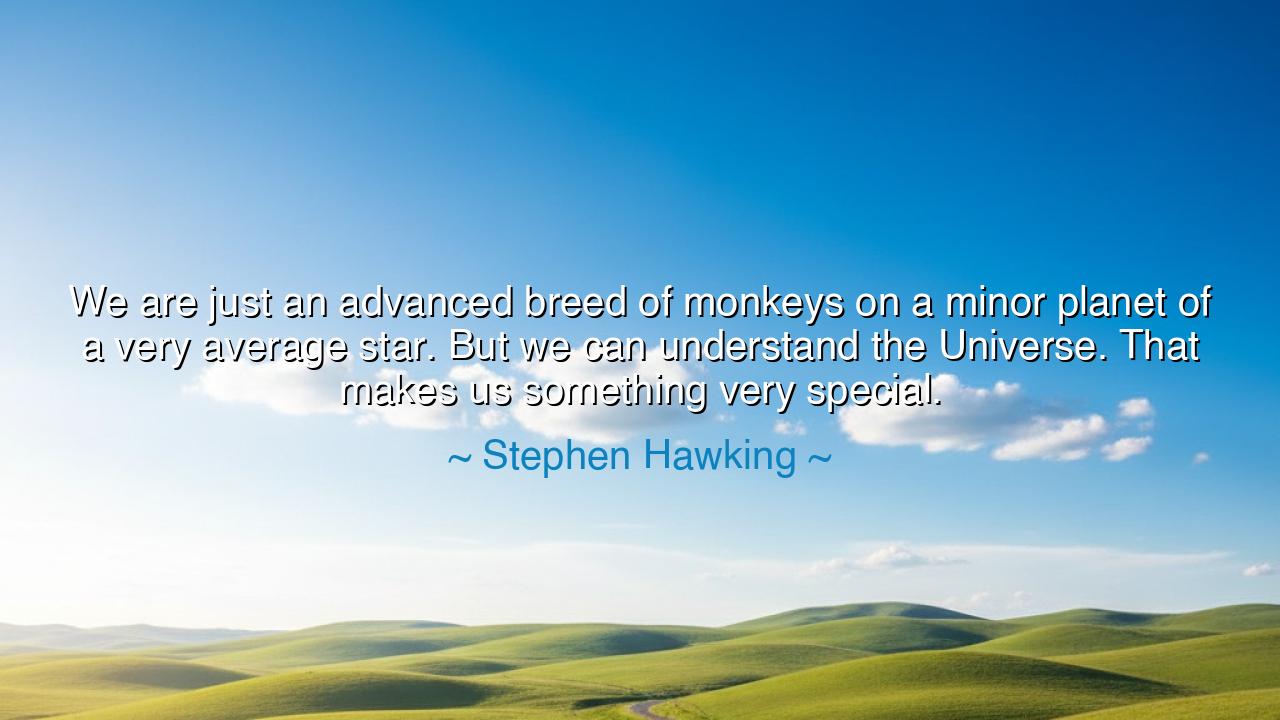
We are just an advanced breed of monkeys on a minor planet of a
We are just an advanced breed of monkeys on a minor planet of a very average star. But we can understand the Universe. That makes us something very special.






In the grand theater of the cosmos, where stars burn with ancient fire and galaxies spin in their eternal dance, there lies a truth both humbling and profound: we are but a small, fleeting presence in the vast expanse of the universe. Yet, as Stephen Hawking so eloquently put it: "We are just an advanced breed of monkeys on a minor planet of a very average star. But we can understand the Universe. That makes us something very special." These words carry the weight of both humility and inspiration, for in them we are reminded of our smallness, yet also of our unique ability to perceive and comprehend the wonders of the universe itself.
Hawking's statement forces us to confront the reality that, in the grand scale of existence, we are not the center of all things. The Earth, once believed by ancient peoples to be the center of the cosmos, is but a minor planet orbiting a star that is nothing more than an average, unremarkable ball of fire in the vast sea of the universe. The ancients, in their wisdom, saw the stars as divine and the universe as something beyond comprehension, a divine realm to which only the gods had access. Yet, as time has passed, we have come to realize that our home is not so special, and the vastness of the universe is far beyond anything our ancestors could imagine. Yet, in this truth, Hawking finds the paradox that makes humanity unique: we are capable of understanding the very forces that shape the cosmos.
Think of the ancient philosophers, who looked up at the night sky and sought to understand its mysteries. Aristotle believed that the heavens were perfect and unchanging, a realm reserved for the gods. Pythagoras saw the movements of the planets as reflections of harmony and mathematical perfection. These thinkers, though limited by the knowledge of their time, laid the foundations for the scientific understanding of the universe. They, too, grappled with the same questions that Hawking did, though they did not have the tools to answer them. Yet, they understood that in contemplating the heavens, humanity could transcend its earthly existence and tap into something far greater than itself.
Hawking’s words remind us that understanding is what sets humanity apart. The ancient cultures believed the universe to be a place of divine mystery, but humanity’s gift lies in its ability to seek understanding, to question, to explore, and to unravel the mysteries of existence. This is the essence of what makes us “special”—not that we are the center of the universe, but that we have the capacity to grasp the truths that govern it. The fact that we can gaze into the night sky, and through the lens of science, begin to comprehend the forces at play, is a gift and a responsibility. It is this very ability to understand, to inquire, that has propelled humanity to great heights.
Consider, too, the story of Galileo, the great astronomer, who, using a simple telescope, challenged the view of the universe held by the most powerful minds of his time. When he looked at the sky, he saw stars, planets, and moons, not as the divine realms of the gods, but as physical objects governed by the same laws of nature that govern the Earth. His discovery, though met with resistance and even persecution, marked the beginning of a new era in human thought. Galileo’s ability to understand the heavens was not a small thing—it was a turning point in the history of humanity, a shift that led us to a more rational, more scientific view of our place in the cosmos.
In Hawking’s words, there is a call to action, to recognize that the gift of understanding is not a passive one, but one that requires engagement. It is not enough to marvel at the wonders of the universe; we must actively seek to understand them, to pursue knowledge with both humility and ambition. The scientific revolution of the past few centuries has proven that our curiosity can lead us to remarkable discoveries, from the laws of gravity to the nature of black holes. And yet, our journey is far from over. The universe is vast, its mysteries deep, and the pursuit of knowledge is an eternal one. But it is a pursuit that defines humanity. Our quest to understand the cosmos makes us not just creatures of the Earth, but explorers of the infinite.
O children of the future, heed this lesson well: while the universe may be vast and we may be but a small part of it, our ability to understand it makes us unique. We are not bound by the limits of our physical world; we can look to the stars and know that we are part of a larger, eternal dance. It is our gift, our duty, and our privilege to seek understanding, to ask the questions that stir the human spirit, and to pursue answers with both humility and courage. Let the quest for knowledge guide you, for in it lies the true greatness of humankind, the ability to grasp the mysteries of existence and to know, however briefly, our place within the infinite expanse of the cosmos.






AAdministratorAdministrator
Welcome, honored guests. Please leave a comment, we will respond soon